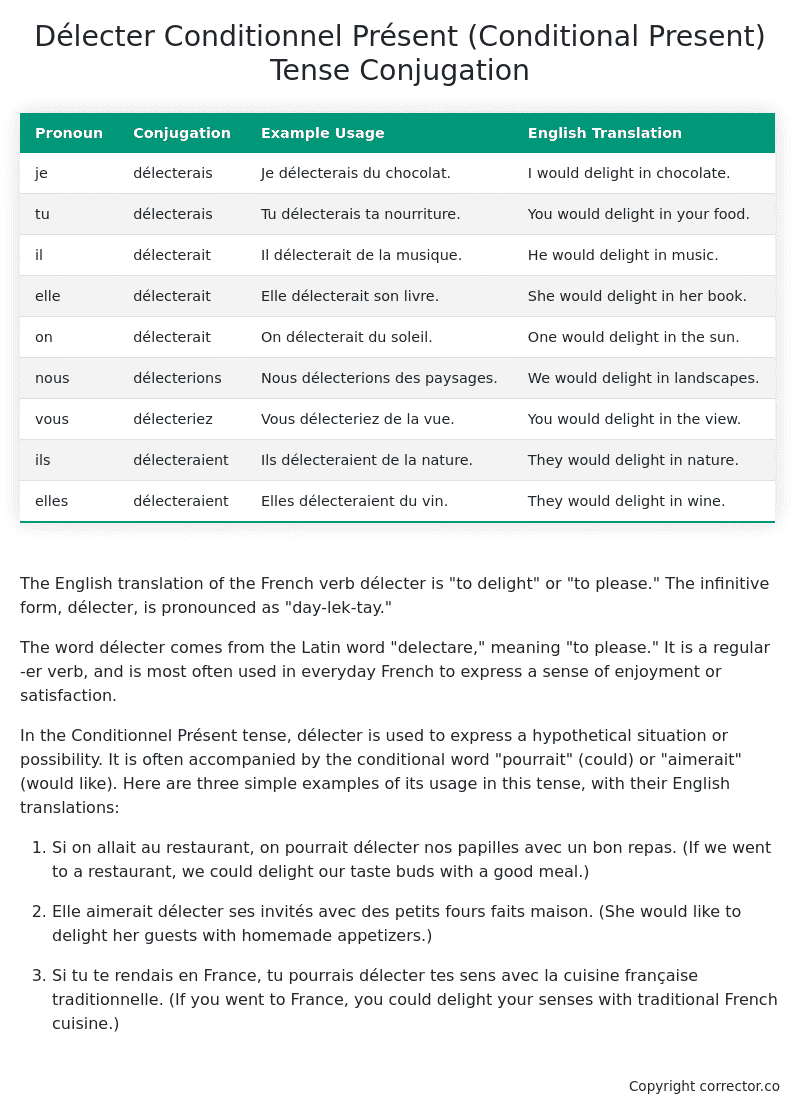Conditionnel Présent (Conditional Present) Tense Conjugation of the French Verb délecter
Introduction to the verb délecter
The English translation of the French verb délecter is “to delight” or “to please.” The infinitive form, délecter, is pronounced as “day-lek-tay.”
The word délecter comes from the Latin word “delectare,” meaning “to please.” It is a regular -er verb, and is most often used in everyday French to express a sense of enjoyment or satisfaction.
In the Conditionnel Présent tense, délecter is used to express a hypothetical situation or possibility. It is often accompanied by the conditional word “pourrait” (could) or “aimerait” (would like). Here are three simple examples of its usage in this tense, with their English translations:
-
Si on allait au restaurant, on pourrait délecter nos papilles avec un bon repas. (If we went to a restaurant, we could delight our taste buds with a good meal.)
-
Elle aimerait délecter ses invités avec des petits fours faits maison. (She would like to delight her guests with homemade appetizers.)
-
Si tu te rendais en France, tu pourrais délecter tes sens avec la cuisine française traditionnelle. (If you went to France, you could delight your senses with traditional French cuisine.)
Table of the Conditionnel Présent (Conditional Present) Tense Conjugation of délecter
| Pronoun | Conjugation | Example Usage | English Translation |
|---|---|---|---|
| je | délecterais | Je délecterais du chocolat. | I would delight in chocolate. |
| tu | délecterais | Tu délecterais ta nourriture. | You would delight in your food. |
| il | délecterait | Il délecterait de la musique. | He would delight in music. |
| elle | délecterait | Elle délecterait son livre. | She would delight in her book. |
| on | délecterait | On délecterait du soleil. | One would delight in the sun. |
| nous | délecterions | Nous délecterions des paysages. | We would delight in landscapes. |
| vous | délecteriez | Vous délecteriez de la vue. | You would delight in the view. |
| ils | délecteraient | Ils délecteraient de la nature. | They would delight in nature. |
| elles | délecteraient | Elles délecteraient du vin. | They would delight in wine. |
Other Conjugations for Délecter.
Le Present (Present Tense) Conjugation of the French Verb délecter
Imparfait (Imperfect) Tense Conjugation of the French Verb délecter
Passé Simple (Simple Past) Tense Conjugation of the French Verb délecter
Passé Composé (Present Perfect) Tense Conjugation of the French Verb délecter
Futur Simple (Simple Future) Tense Conjugation of the French Verb délecter
Futur Proche (Near Future) Tense Conjugation of the French Verb délecter
Plus-que-parfait (Pluperfect) Tense Conjugation of the French Verb délecter
Passé Antérieur (Past Anterior) Tense Conjugation of the French Verb délecter
Futur Antérieur (Future Anterior) Tense Conjugation of the French Verb délecter
Subjonctif Présent (Subjunctive Present) Tense Conjugation of the French Verb délecter
Subjonctif Passé (Subjunctive Past) Tense Conjugation of the French Verb délecter
Subjonctif Imparfait (Subjunctive Imperfect) Tense Conjugation of the French Verb délecter
Subjonctif Plus-que-parfait (Subjunctive Pluperfect) Tense Conjugation of the French Verb délecter
Conditionnel Présent (Conditional Present) Tense Conjugation of the French Verb délecter (this article)
Conditionnel Passé (Conditional Past) Tense Conjugation of the French Verb délecter
L’impératif Présent (Imperative Present) Tense Conjugation of the French Verb délecter
L’infinitif Présent (Infinitive Present) Tense Conjugation of the French Verb délecter
Struggling with French verbs or the language in general? Why not use our free French Grammar Checker – no registration required!
Get a FREE Download Study Sheet of this Conjugation 🔥
Simply right click the image below, click “save image” and get your free reference for the délecter Conditionnel Présent tense conjugation!

Délecter – About the French Conditionnel Présent (Conditional Present) Tense
Formation
Common Everyday Usage Patterns
Expressing Polite Requests
Expressing Hypothetical Situations
Expressing Doubt or Uncertainty
Interactions with Other Tenses
Present Tense
Past Tense
Future Tense
Conditional Perfect
Summary
Want More?
I hope you enjoyed this article on the verb délecter. Still in a learning mood? Check out another TOTALLY random French verb conjugation!


